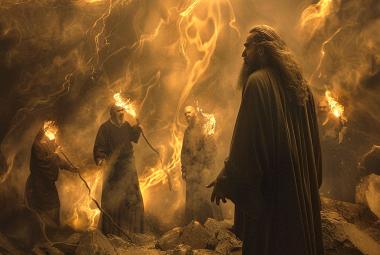Since the Y2K rollover on January 1, it has been interesting to watch the post-event analyses, which divided into two general camps: (1) a hard job well-done that prevented disaster or (2) not a problem in the first place and lots of wasted money and time.
That Y2K is a serious problem seems evident. Presidential Y2K Czar, John Koskinen, reaffirmed the seriousness of Y2K in his January 2nd press conference, indicating that the Y2K disaster was averted only by the hard work of a lot of people. We might add that it was also staved off by the investment of billions of dollars into remediation worldwide and by the fact that a number of "alarmists" began yelling two years ago that we were headed for disaster if something were not done.
Right down to the wire there was uncertainty as to whether the work accomplished would be adequate. Emergency preparedness centers and organizations continued to urge people to prepare. The federal government and a number of cities invested millions in emergency command "bunkers." This was an awful lot of work and money for a non-problem. So...
Was It a Non-Event?
The Defense Department acknowledged that there was an intelligence blackout on New Year's Eve as a result of Y2K glitch. The country of Gambia has its infrastructure hard hit by the Y2K bug.1 Gambia declared Monday, January 3, a non-working day to reduce pressure on its crippled services.
The computer system used to track railway goods in Mali went down.2 Seven nuclear power plants in the US reported minor problems with support systems and the North American Electrical Reliability Council (NERC) reported several utilities had minor glitches in their clock-synchronization sections. Air traffic control broke down in the northeast due to a botched Y2K patch. 911 broke down in Charlotte, North Carolina. Two systems on the Bay Area Rapid Transit District (BART) in the San Francisco Bay Area failed. Lowlevel Windshear Alert Systems (LLWAS) failed at airports in Tampa, Denver, Atlanta, Orlando, Chicago, and St. Louis.3 Power conditioning systems at Rochester, Greensboro, Memphis and Birmingham airports failed.4 Security access systems at federal buildings in Omaha, Nebraska failed.5 New Zealand had a serious air traffic control outage that grounded planes and stranded passengers. Authorities there have not yet confirmed whether that was a Y2K outage.6
The most embarrassing faux pas was the failure of the web page calendar of the US Naval Observatory - the people we rely on for accurate time to the microsecond. Their web page read the year as 19100 instead of 2000.7
A non-event? Hardly. In reality it became a non-serious event due to a lot of work and we're thankful it was contained as well as it was. At the same time, some valid hardball questions will have to be answered in the coming months. There is a huge backlash against the quantity of money spent on remediating the bug. Was the problem overstated or was the amount of completed remediation understated? Some people are wondering why certain sectors stayed up in countries that were slated to go down hard.8 Even countries, which had done little if any work, such as Malaysia, one that was planning to fix on failure, didn't have any trouble keeping its power up. What gives? Those are valid questions.
The game isn't over but the critical time for infrastructure has passed. Think tanks such as the Gartner Group were predicting in late 1999 that very little would happen right on January 1 - about 10% by their estimate.9 They estimated a remaining 45% of Y2K problems would begin showing up after January 1 and continue throughout the year. One person referred to it as the "molasses phase" of Y2K, as it becomes an expensive, year-long, ongoing headache. Most of these glitches will be solved within days and will not be apparent to the public at large but they can still take a serious toll on the economy.
Dr. Ed Yardeni and others are holding off final judgment on Y2K. We're really only in the third quarter of the game. It will mostly likely be six months to a year before we can seriously evaluate Y2K. For now the infrastructure crisis is past.
In our very first briefing pack in 1998 we said we hoped Y2K would turn out to be nothing. Our purpose was to alert people to a potentially dangerous situation and prepare them in case it turned out that way. The fact that most of the world's population was spared the negative impacts that more dire scenarios could have produced is a cause for praise and a direct answer to all of those that prayed for this very outcome. We never "predicted" or "prophesied" what was going to happen. We, carefully and clearly, stated that our suggested preparations were based on "not knowing" what would happen.
Are we sad or disappointed these things didn't occur? Would we have rather had a more negative outcome? Of course not. Our great concern for those least able to protect and prepare, the aged, infirmed and poor, is what led us to call the Church to preparation. We are ecstatic that these people, even though the Church didn't cover them, were spared any downside impact of Y2K.
In calling others, we were in good company with the Federal Emergency Management Agency, the Red Cross, the National Guard and others in telling people to prepare just in case. It wasn't a matter of being right or wrong as some have defined it - just prudent.
Notes:
- Agence France Presse, "Gambia gets hit by computer bug," January 2, 2000.
- "Maili Rail System is Victim of Y2K," Yahoo News from Associated Press, January 5, 2000.
- President's Y2K Office, "Incident Reports," , January 1, 2000, 3:00 p.m. Briefing.
- Ibid.
- Ibid.
- "Computer Glitch Affects Tracking of Aircraft in New Zealand ," The Associated Press via apb.com
- Ibid.
- Faiola, Anthony. "Some Abroad Say the Y2K Fix Was In," Washington Post, January 6, 2000.
- "Gartner Foresees Quiet Y2K Weekend With Problems Arising Throughout Year," www.infoworld.com, December 28, 1999.





